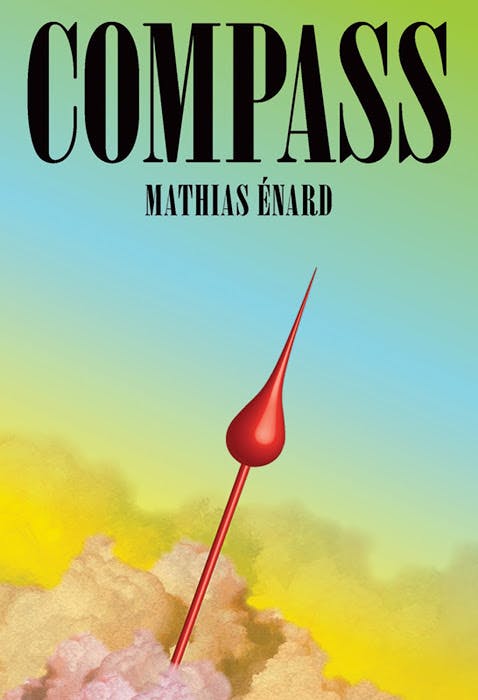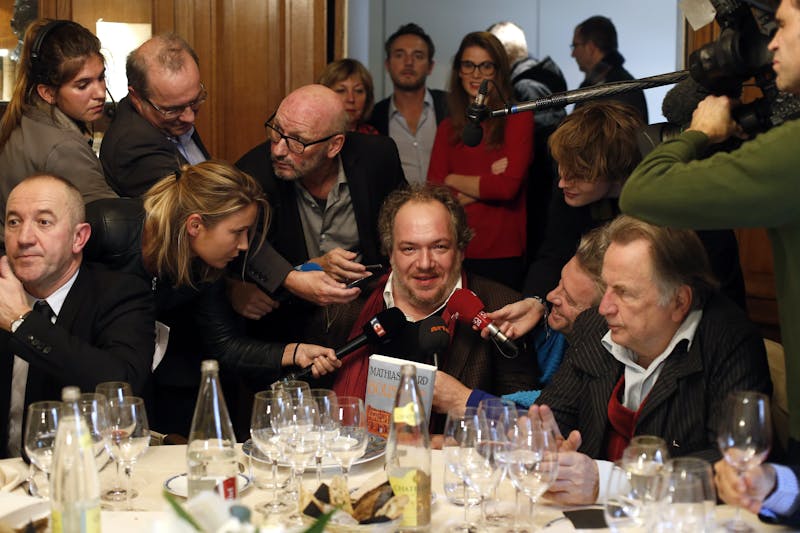In Paris, late in 2015—a year that had opened with terrorist attacks at the satirical paper Charlie Hebdo—reporters and photographers thronged at the Drouant restaurant to learn which book had been awarded France’s most prestigious literary prize, the Prix Goncourt. As the name was uttered, flashbulbs went off and journalists clamored around a rotund face: That of Mathias Énard, who had just won for his magnum opus, Compass.
It was a hefty volume, four hundred close-set pages, with a seemingly simple subject: How the West views the East. A timely subject, too. Ten days after Énard’s win, a second, even bloodier set of attacks drew the world’s attention to the Bataclan concert hall and other Parisian locales struck by terror. The president, François Hollande, ordered that the country’s borders be closed. If France’s Muslim population had already been viewed with suspicion, the following days and months subjected them, along with a fresh influx of immigrants and refugees fleeing the Middle East, to extraordinary levels of scrutiny. Even now, the country is in a state of emergency.

The book indelibly associated with that time period is not Compass, but Michel Houellebecq’s Submission. It was published the same day as the Charlie Hebdo attacks, and his caricature also happened to adorn Charlie Hebdo’s cover: A wizened man drawling, “In 2015, I’ll lose my teeth; in 2022, I’ll do Ramadan.” This was a reference to Submission’s premise: In the year 2022, the far-right French politician Marine Le Pen gains enough popularity to be within reach of the French presidency. To forestall such a fate, a group of political parties forms a coalition headed by a fictional Muslim Brotherhood. Upon winning the lion’s share of votes, the new president, as amiable as “a Tunisian neighborhood grocer,” puts France under a benevolent form of Sharia law.
Was Submission meant as a satiric critique of Sharia? Or did it imply that Houellebecq was actively exploring what opportunities Islam might offer? Houellebecq himself acknowledged that “it’s not clear what we are meant to be afraid of, nativists or Muslims. I leave that unresolved.” Among Houellebecq’s critics was Christine Angot, who did not mince her words in Le Monde: “It’s a book that dirties whoever reads it.” She deemed Houellebecq a writer driven by fear, unwilling to concede that people unlike himself could be brethren. Adam Shatz, in turn, framed him in the London Review of Books as “a man without convictions.”
Either way, it presaged a debate that has often been characterized by the notion of one culture submitting to another. (In Arabic, “Islam” literally means voluntary surrender or submission.) In France, Muslims have found themselves cast, not for the first time in the post-9/11 era, as an existential “other”—most clearly visible in the police enforcement of a burkini ban. France’s rigid separation between church and state, laïcité, insists that those within its borders must “assimilate” within a generic French type: That is, a predominantly white, predominantly Christian type. A submission of another kind.
In this year’s presidential elections, the real-life Marine Le Pen seems poised to garner a full quarter of the French vote based on her xenophobic platform to protect French identity. Her most visible competitor, the centrist candidate Emmanuel Macron, is more keen on opening borders and welcoming outsiders to boost trade and the exchange of ideas. Each is straining toward their own particular idealism, and a vote for one candidate seems to be a vote for a future vastly different from the other offered.
And so, at a moment even more auspicious than that of its original publication in French, Charlotte Mandell’s radiant translation of Compass into English provides its readers with the opportunity to step back and consider the question of how France and the rest of the West might look at Islam and, for that matter, the world east of Europe.
Compass is not strictly French in its outlook: Énard has spent long stretches of time in Damascus, Beirut, and Tehran, and has resided in Barcelona for the past decade and a half. He may be thoroughly steeped in French literature and literary style, but he stands apart from his countrymen in being well-versed in the Persian and Arabic languages and their histories. And, much like his 500-page-long, one-sentence novel Zone, the beauty of Compass is the sheer breadth and density of its vision, calling forth a multitude of different worlds, bound only by the capacious mind of its narrator, an aging Austrian musicologist named Franz Ritter.

The memories and stories that Ritter meditates on are decades, even centuries, old, but the story itself is limited to a single night. He is sleepless, worried that the illness that afflicts him may be a terminal one, and thinking back upon his unrequited love for Sarah, a younger academic from France who shares many of his interests and sensibilities. There is no question that Ritter is speaking to us in our present moment—there are mentions of Google and lamentations that the “holy war today is anything but spiritual”—but he festoons his flights of fancy and mental peregrinations with a dizzying assortment of historical personalities, from Klaus Mann and Xavier de Maistre to Marga d’Andurain and Suleyman the Magnificent.
He often cites historical texts and the academic treatises he and Sarah have each written, and Compass itself purports to comprise multiple volumes of a text Ritter dubs (in Gothic blackletter) “On the Divers Forms of Lunacie in the Orient.” But the real chronology of the story is marked at the beginning of each chapter: The book begins in Ritter’s bed in Vienna not long before 11:10 pm, and the final chapter starts at 6:00 am, a moment of darkness before the “warm sunlight of hope” heralding the book’s end.
The book’s structure is a clear reference to Scheherazade, the narrator of One Thousand and One Nights, who must keep the sultan up with stories until dawn to save her life. Enard shows how this text is weaved into the fabric of French literature: Proust, who allowed memory to be the driving force of his work, is another inspiration here, and Proust himself was deeply inspired by One Thousand and One Nights: “the book of night, the book of struggle against death…without that dream of the Orient (the dream in Arabic, Persian, and Turkish, stateless, which we call the Orient), no Proust, no In Search of Lost Time. With my flying carpet and its built-in compass, where would I go? The Viennese dawn in December will be worlds away from the desert dawn.”
Énard’s refusal to let one part of the world or one culture assert absolute authority over the other shows his readers how they themselves might shoulder many contradicting realities. No monolithic religion or reality holds sway here; even “the Orient” proves to be a pure fiction that cannot square with actual existence. Both Sarah and Franz are struck by a quotation: “‘Easterners have no sense of the Orient. It’s we Westerners, we Roumis, as the Muslims call us, Christians, who have some sense of the Orient’...Orientalism as rewrite, Orientalism as lament, as a forever disappointing exploration.”
The compass of the book’s title literally points east. It is Sarah’s gift to Franz, a replica of Beethoven’s own compass, which was altered so it pointed not northward but eastward. In reorienting us in the same way, Compass breathes life into the ashes of history, forcing its readers to see anew the world around them. It is hard to read Ritter’s ruminations on Aleppo without a sense of dismay: “Today all these places are prey to war, burning or burned, the metal shutters of shops deformed by the heat of fire...will Aleppo ever regain its splendor, maybe, you never know.”
In an interview published shortly after winning the Prix Goncourt, Énard asserted that the media’s constant focus on radical Islam and violent conflict “hinders any prospect of discovering the region’s historical richness and variety. And it obscures the dialogue that could develop between the Orient and the Occident.” Still, like Franz Ritter, he was optimistic: “There are no insurmountable boundaries. Rules are there to be broken.” If his boundless curiosity is any indication, there may well be reason to hope that the West can look at the East, not with presuppositions or stereotypes, but with an openness that allows them to glean a reality they had never seen before.
